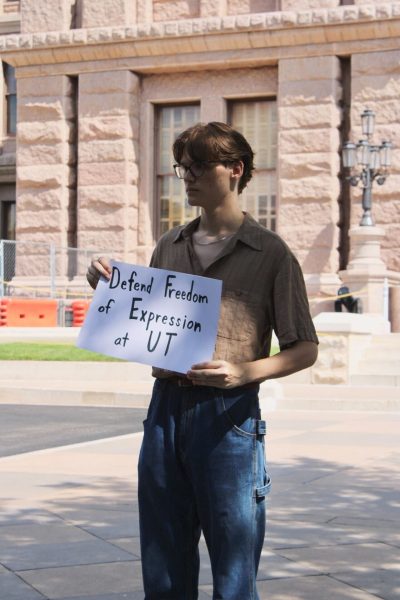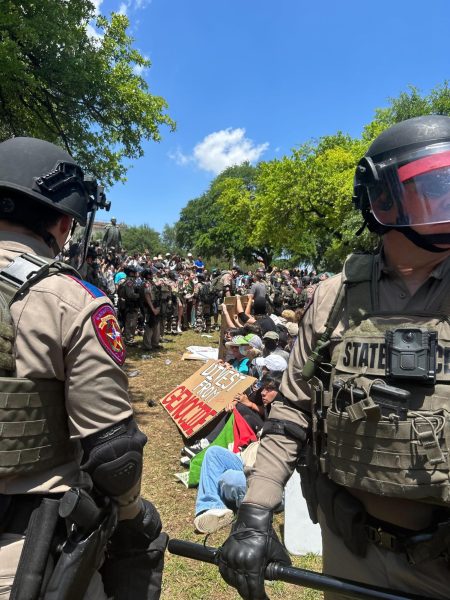
Eden Shamy
Controversy and confusion swirl around college campuses in Texas. Under the new free speech restrictions and a stifling political environment, many are left to wonder what kinds of speech are protected or punished.
“They’re seeing the power of students when they lock arms with community members, and they’re terrified,” said Daniel Ramirez, a sophomore at the University of Texas and member of Austin Students for a Democratic Society.
At UT, some community members think Texas is leading a national effort to suppress speech through Texas Senate Bill 2972, also known as the “Campus Protection Act”, and new committees on civic discourse. However, the community retains a long history of opposing restrictions on expression, going back to the Red Scare and the Vietnam War. Through protests, lawsuits, panels and the press, a new generation of Austinites seek to challenge the legality of the act and continue a civic battle that’s persisted for a hundred years.
1944 Funeral Procession for Academic Freedom
In the 1940s, governors stacked the UT Board of Regents with ultra-conservative appointees. When a wave of Red Scare tactics and accusations hit the university, the Board of Regents didn’t deny them but amplified them. They demanded that UT President Homer Rainey fire four economic professors who taught about New Deal policies and progressive labor laws.
When Rainey refused, the board launched investigations into “subversive Communist doctrine” in course curriculum. They also requested that Rainey step down when he publicly advocated for racial equality. The regents removed Rainey from office on Nov. 1, 1944, sparking weeks of protest.
Students boycotted classes and 8,000 people marched from downtown to the Tower. Students carried a casket marked “Academic Freedom,” followed by the Longhorn Band playing Chopin’s “Funeral March.”
Community members supported the protest, like Reverend Blake Smith of the University Baptist Church. Standing outside the Gregory Gymnasium, he called the struggle at UT a battle of “Nazism and Fascism against democracy.”

At a “Protect Free Speech” press conference hosted by the Students for a Democratic Society on September 12, the Rev. Natalie Webb said she is following in Smith’s footsteps.
“We are standing with our students,” Webb said. “That’s why my church was founded.”
Located on Guadalupe Street across from campus, the University Baptist Church supports the community by offering their church as a space for students to host events and organize. Webb said new laws that restrict community members like herself from supporting campus activism could lead to more isolation and division.
“That is cutting them off from a clear source of support and collaboration for good,” Webb said.
The 1969 Chuck Wagon Riot
Similarly, the university attempted to crack down on outsiders in the 1960s. As progressive movements like the Vietnam War protests surged across the nation, the Chuck Wagon in the Texas Union became popular not only for students but activists, traveling musicians and a few runaways. Groups like Students for a Democratic Society and other prominent “radicals” frequented the eatery, which is now known as the Cactus Cafe.
In November 1969, however, the university began requiring student IDs to enter the Chuck Wagon. In an act of defiance, hundreds of students and non-students alike refused to show ID and occupied the building. Law enforcement officers flooded the Chuck Wagon bearing riot gear and mace. Chairs flew, windows broke and rioters slashed the police’s tires to free the detainees. Ultimately, 21 people were indicted and the ID rule remained in effect at the Chuck Wagon until 1973.
2019 Expansions of Free Speech
The University continued operating as a limited public forum until 2019 when numerous Texas universities faced backlash over conservative demonstrations. Texas A&M faced particular controversy over the cancellation of a rally by white nationalist Richard Spencer.
Lawmakers expressed concern over the suppression of diverse viewpoints, so they passed Senate Bill 18. This turned all the common outdoor areas on public campuses into public forums: a place where all people could express their First Amendment rights. The bill also prohibited universities from “disinviting” speakers, and it allowed universities to sanction students who interfered with free speech.
“Some colleges are banning free speech on college campuses. Well, no more,” Gov. Greg Abbott said in a video from 2019 of him signing the bill.
Divestment Demands Sweep Universities Nationwide

Despite these expansive free speech protections, the University still shut down demonstrations it didn’t approve of.
In April 2024, pro-Palestine protests swept across universities nationwide demanding divestment from weapons companies that arm Israel. At UT, the Palestine Solidarity Committee coordinated a march to the Tower to “occupy” the lawn from around noon to 8 p.m. The “Popular University” encampment featured guest speakers on the genocide in Gaza, study breaks, pizza and an art workshop.
The law stated that the University shall “permit any person to engage in expressive activities” in the common outdoor areas, but the University said encampments violate institutional rules.
Still, the student group moved forward with the protest on April 24. The demonstration quickly turned into a mass protest when dozens of law enforcement officers descended upon Speedway at the outset of the march. Law enforcement arrested 57 protesters that day.
“These protesters belong in jail,” Gov. Abbott tweeted on X as the events unfolded.
Like many of his predecessors, Abbott filled the Board of Regents with wealthy conservatives who donated to his campaigns. Following the arrests, Chairman Kevin Eltife, a career Republican politician, added that the board was “proud of how this has been handled.”
Multiple other pro-Palestine protests ensued in the following week, joined by both students, staff, veterans groups and other concerned citizens. Dozens of arrests followed. However, the Travis County Attorney Delia Garza promptly dropped most charges against protesters because law enforcement lacked probable cause.
The Campus Protection Act
Still, the university pinned the blame on agitators “not affiliated with UT.” Like the Red Scare tactics of the 1940s, many politicians nationwide painted pro-Palestine protesters as radicals backed by foreign actors and terrorist organizations. Representatives and university administrators vowed to increase safety.
Thus, the new speech restrictions that went into effect on September 1 were dubbed the Campus Protection Act. Supporters of the bill said it would set clear boundaries to prevent disruptions on campus. The act eliminates public forums in a complete reversal of the free speech protections that Republicans championed in 2019. Individuals who are not students, faculty or staff cannot use or even witness expression on campus.
A variety of students from UT Austin and Dallas swiftly filed lawsuits over concerns that the act will obstruct their regular operations on campus.
Just days after the act went into effect, Students for a Democratic Society requested the support of Street Medics Austin at their anti-deportation protest. The medics are a non-partisan group that offers “aid without an agenda” to help people stay safe while exerting their First Amendment rights. Out of the 12 medics who arrived, the lone incident commander was not a student. Under the new law, the Office of the Dean of Students threatened her with criminal trespassing charges.
“We did not think [the act] was going to affect our work on campus,” said Julia Heilrayne, a UT alumni and the Vice President of the Board of Directors for Street Medics Austin. “We’ve been responding to events on [the] UT campus for years now.”
Without the leadership of their incident commander, Heilrayne said the team could not operate and were forced to leave. Street Medics Austin has paused deployments on campus and called upon the community for support.
The University did not respond to questions regarding whether Street Medics Austin or other aid groups would be allowed onto campus for the safety of future demonstrations. While the University handles ongoing litigation, it remains to be seen how the act will be implemented. Plus, new legislative committees on “Civic Discourse and Freedom of Speech in Higher Education” complicate matters even more.
For activists like Ramirez, the future remains foggy, but the parallels within UT’s history are clear. He believes today’s protests will eventually be seen in the same light as past movements, vindicated by progress.
“We’re going to join hand in hand with students and the community to fight this,” Ramirez said.